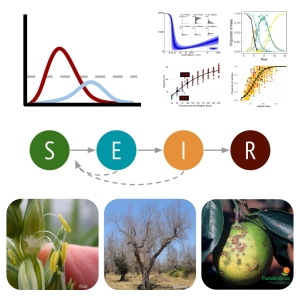Doutorando: Kaique dos Santos Alves. Data: 11/08/2020, às 16:00 horas pelo canal do YouTube (pos.fitopatologia UFV) Link: https://www.youtube.com/channel/UCCZZh5mUepI3YHAYxBuU7qw. Orientador: Emerson M. Del Ponte
For any newly emergent disease of great impact, whether to humans, animals, or plants, an understanding of its epidemiology – the disease spread in the population – is essential to define the strategies to contain its advance in time and space. When the COVID-19 pandemics started to spread globally, affecting the human population in early 2020, epidemiological models, a simplification of the system expressed mathematically, were essential to simulate possible future scenarios as a result of actions to contain its progress. This is no different for diseases in plants. During more than six decades the dynamics of complex pathosystems have been described by relatively simple mathematical models. These models have played an important role in the formulation of both strategic and tactical management decisions. These models can be formulated in different ways and present varying structures and complexity. They are used to describe and compare epidemics, to predict the risk of disease occurrence, or to simulate scenarios of epidemic progress. In this seminar, I will focus the attention to compartmental, or mechanistic, models. These allow simulating disease progress using the disease cycle as the reasoning for its mathematical structure. Their structure is quite similar to those used to simulate scenarios during the COVID-19 pandemic. I will provide an overview of some of the mechanistic models with examples of their utility for defining disease management strategies.

